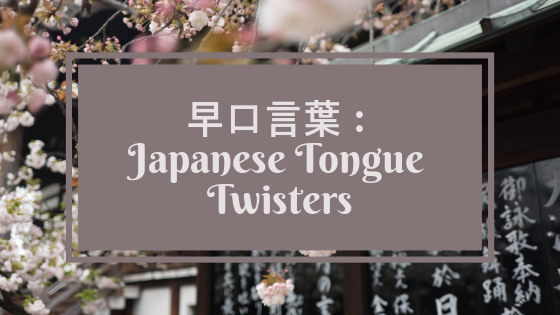
I was watching videos on Youtube and came across a video on Japanese tongue twisters. I am terrible at tongue twisters in English (my native language) – I can just about say ‘She sells seashells by the seashore’ without messing up!
Because of this, I had shied away from tongue twisters in Japanese, but watching a video on tongue twisters made me realise that learning tongue twisters are not only fun but also useful Japanese speaking practice.
Benefits of learning tongue twisters
Tongue twisters are often seen as something for children, and therefore not worth learning as an adult. This is partly because tongue twisters were invented as a way for children to enjoy practicing tricky sounds. Similarly, TV presenters often use tongue twisters as a warm up to improve pronunciation.
There are definite benefits from practicing tongue twisters:
- It gets you used to the sounds of Japanese which may not exist in your native language
- You train your muscle memory on the subtle differences between similar sounds. By having to make these similar sounds so closely together within the same phrase, your mouth muscles get used to the slight changes in mouth movements required to say them effectively.
- You learn to hear the difference between similar sounds used within the same word or phrase, eg. かく vs きゃく.
- They are fun! Learning something silly in Japanese is bound to be more interesting and therefore easier to remember than ‘田中さんは日本人です’. Plus, even if you mess up you can be forgiven as tongue twisters are difficult for native speakers too!
- You get bragging rights – it is pretty satisfying to finally get them right after a lot of practice (especially if you are terrible at tongue twisters like me)
Japanese Tongue Twisters
The Japanese term for tongue twisters is 早口言葉.
There are a whole bunch of Japanese tongue twisters out there – this Japanese website has a whole bunch for you to practice!
|
早口言葉 はやくちことば Hayakuchi kotoba Literally ‘fast mouth words’ |
I definitely recommend practicing these with a Japanese friend or language partner as it is great fun to share with other language learners. Alternatively, you could use HiNative or HelloTalk to record yourself and get feedback on how you did.
If like me, you do not have as much time to practice speaking, I think this is a great way of practicing the sounds of Japanese by yourself in just a few minutes every day. YouTube is a great source of audio to find people to mimic and to compare your own pronunciation against.
An example is this video by JapanesePod101, which covers some of the most well-known Japanese tongue twisters.
It is worth saying that tongue twisters do not always make perfect sense, so are not the best to use to study in depth. Here are 5 of my favorite 早口言葉 that are not featured in the JapanesePod101 video that are also popular (with very rough English translations):
東京特許許可局
とうきょうとっきょきょかきょく
Tokyo Patent Office
裏庭には二羽、庭には二羽鶏がいる
うらにわにはにわ、にわにはにわにわとりがいる
There are two chickens in the rear garden, and two chickens in the other garden
この猫ここの猫の子猫この子猫ね
このねこここのねこのこねここのこねこね
This kitten is the cat of the cat here, this kitten
隣の客はよく柿食う客だ
となりのきゃくはよくかきをくうきゃくだ
The neighbour’s guest is a guest who often eats persimmons
蛙ぴょこぴょこ3ぴょこぴょこ、合わせてぴょこぴょこ6ぴょこぴょこ
かえるぴょこぴょこみぴょこぴょこ、あわせてぴょこぴょこむぴょこぴょこ
The frogs jump three times, all together they jump six times
What is your favourite tongue twister (in Japanese or any other language)? Let me know in the comments!

Wow, that’s really interesting. I never actually thought about the benefits of tongue twisters. Also, I usually tend to forget them…just like jokes 🙂 I tried to read your examples fast, but I only managed the last one to get fluently out at a faster tempo. That cat one is devilish.
And because you were asking (and you mentioned you wanted to learn German) here a couple ones from my native language:
Fischers Fritze fischt frische Fische;Frische Fische fischt Fischers Fritze.
That guy is fishing a lot of fish. That’s a classic. And really difficult to say fast a couple of times after each other. Here is another one:
Denke nie du denkst, denn wenn du denkst, du denkst, dann denkst du nicht, dann denkst du nur du denkst, denn das Denken der Gedanken ist gedankenloses Denken.
It’s about not thinking about thinking, because if you think about not thinking, then it is thinking less thinking?
I hope you like them 🙂
LikeLiked by 1 person
I’m glad you liked the post 🙂 Wow, the German ones are cool (the fish one seems so difficult though) – thanks for sharing!
LikeLiked by 1 person
I never tried Japanese tongue twister before but these are fun! I found the first one hard. 許可局 is hard for me to pronounce. I find the last one about frogs easy, but I think my favorite is the one about chickens because I like its rhythm. 😊
LikeLiked by 1 person
I’ve tried the 許可局 one so many times but I can’t seem to get it right consistently! The chicken one is my favourite too ^^
LikeLiked by 1 person